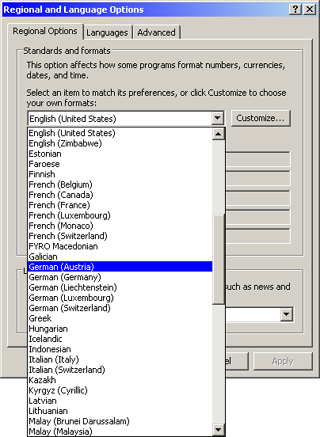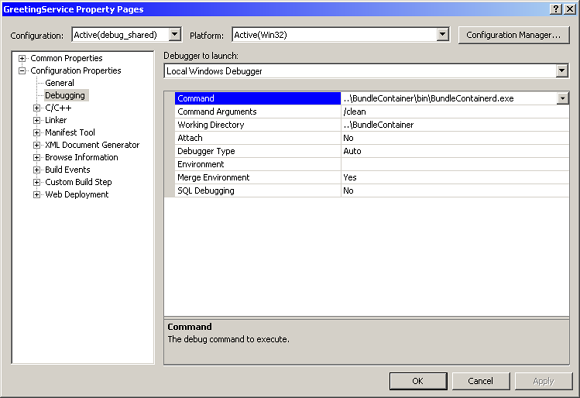Welcome
Welcome to the OSP tutorial. This tutorial shows you how to create an application that uses OSP, and how to create OSP bundles. You can find the source code, project files and makefiles for the tutorials in the samples directory in the OSP source tree.
Initializing OSP
The OSP framework can be added to any C++ application using POCO. However, correctly initializing the OSP machinery requires some work. To simplify this, OSP provides the Poco::OSP::OSPSubsystem class, which can be simply added to any application based on the Poco::Util::Application or Poco::Util::ServerApplication class.
The BundleContainer sample shows how an application can use the OSP framework, using the Poco::OSP::OSPSubsystem class.
#include "Poco/Util/Application.h"
#include "Poco/Util/Option.h"
#include "Poco/Util/OptionSet.h"
#include "Poco/Util/HelpFormatter.h"
#include "Poco/Util/AbstractConfiguration.h"
#include "Poco/OSP/OSPSubsystem.h"
#include "Poco/OSP/ServiceRegistry.h"
#include <iostream>
using Poco::Util::Application;
using Poco::Util::Option;
using Poco::Util::OptionSet;
using Poco::Util::HelpFormatter;
using Poco::Util::AbstractConfiguration;
using Poco::Util::OptionCallback;
using Poco::OSP::OSPSubsystem;
using Poco::OSP::ServiceRegistry;
class BundleContainerApplication: public Application
{
public:
BundleContainerApplication():
_pOSP(new OSPSubsystem),
_showHelp(false)
{
addSubsystem(_pOSP);
}
ServiceRegistry& serviceRegistry()
{
return _pOSP->serviceRegistry();
}
protected:
void initialize(Application& self)
{
loadConfiguration(); // load default configuration files, if present
Application::initialize(self);
}
void defineOptions(OptionSet& options)
{
Application::defineOptions(options);
options.addOption(
Option("help", "h", "display help information on command line arguments")
.required(false)
.repeatable(false)
.callback(OptionCallback<BundleContainerApplication>(
this, &BundleContainerApplication::handleHelp)));
options.addOption(
Option("config-file", "f", "load configuration data from a file")
.required(false)
.repeatable(true)
.argument("file")
.callback(OptionCallback<BundleContainerApplication>(
this, &BundleContainerApplication::handleConfig)));
}
void handleHelp(const std::string& name, const std::string& value)
{
_showHelp = true;
displayHelp();
stopOptionsProcessing();
_pOSP->cancelInit();
}
void handleConfig(const std::string& name, const std::string& value)
{
loadConfiguration(value);
}
void displayHelp()
{
HelpFormatter helpFormatter(options());
helpFormatter.setCommand(commandName());
helpFormatter.setUsage("OPTIONS");
helpFormatter.setHeader("A container for Open Service Platform bundles.");
helpFormatter.format(std::cout);
}
int main(const std::vector<std::string>& args)
{
if (!_showHelp)
{
}
return Application::EXIT_OK;
}
private:
OSPSubsystem* _pOSP;
bool _showHelp;
};
POCO_APP_MAIN(BundleContainerApplication)
The Poco::OSP::OSPSubsystem requires a configuration file telling it where bundle files can be found and where the shared libraries of bundles should be cached. A sample configuration file (which also contains a configuration for the logging framework) is shown below:
#
# OSP Configuration
#
osp.codeCache = ${application.dir}codeCache
osp.bundleRepository = ${application.configDir}../bundles
osp.data = ${application.configDir}data
#
# Logging Configuration
#
logging.loggers.root.channel = c1
logging.loggers.root.level = information
logging.formatters.f1.class = PatternFormatter
logging.formatters.f1.pattern = %s: [%p] %t
logging.channels.c1.class = ConsoleChannel
logging.channels.c1.formatter = f1
When running the BundleContainer to develop and test new bundles, be sure to start the BundleContainer executable with the /clean option, to ensure that always the latest version of your bundle is actually loaded.
The First Bundle
This first bundle shows how a Bundle Activator is written, and how a bundle can subscribe to events from the Service Registry.
All the following bundle does is register itself for the events provided by the Service Registry. Whenever an event occurs, it is logged, using the bundle's default logger provided by the bundle context.
#include "Poco/OSP/BundleActivator.h"
#include "Poco/OSP/BundleContext.h"
#include "Poco/OSP/Bundle.h"
#include "Poco/OSP/ServiceRegistry.h"
#include "Poco/Delegate.h"
#include "Poco/ClassLibrary.h"
using Poco::OSP::BundleActivator;
using Poco::OSP::BundleContext;
using Poco::OSP::Bundle;
using Poco::OSP::ServiceEvent;
using Poco::Delegate;
class ServiceListenerBundleActivator: public BundleActivator
/// A very simple bundle that subscribes its
/// BundleActivator to ServiceRegistry events
/// and prints these events.
{
public:
ServiceListenerBundleActivator()
{
}
~ServiceListenerBundleActivator()
{
}
void start(BundleContext::Ptr pContext)
{
// save BundleContext for later use
_pContext = pContext;
// write a startup message to the log
std::string msg("Bundle ");
msg.append(pContext->thisBundle()->name());
msg.append(" started");
pContext->logger().information(msg);
// subscribe for ServiceRegistry events
pContext->registry().serviceRegistered
+= Delegate<ServiceListenerBundleActivator, ServiceEvent>(
this, &ServiceListenerBundleActivator::handleServiceRegistered);
pContext->registry().serviceUnregistered
+= Delegate<ServiceListenerBundleActivator, ServiceEvent>(
this, &ServiceListenerBundleActivator::handleServiceUnregistered);
}
void stop(BundleContext::Ptr pContext)
{
// write a shutdown message to the log
std::string msg("Bundle ");
msg.append(pContext->thisBundle()->name());
msg.append(" stopped");
pContext->logger().information(msg);
// unsubscribe from ServiceRegistry events
pContext->registry().serviceRegistered
-= Delegate<ServiceListenerBundleActivator, ServiceEvent>(
this, &ServiceListenerBundleActivator::handleServiceRegistered);
pContext->registry().serviceUnregistered
-= Delegate<ServiceListenerBundleActivator, ServiceEvent>(
this, &ServiceListenerBundleActivator::handleServiceUnregistered);
}
protected:
void handleServiceRegistered(const void* sender, ServiceEvent& event)
{
std::string msg("Service registered: ");
msg.append(event.service()->name());
_pContext->logger().information(msg);
}
void handleServiceUnregistered(const void* sender, ServiceEvent& event)
{
std::string msg("Service unregistered: ");
msg.append(event.service()->name());
_pContext->logger().information(msg);
}
private:
BundleContext::Ptr _pContext;
};
POCO_BEGIN_MANIFEST(BundleActivator)
POCO_EXPORT_CLASS(ServiceListenerBundleActivator)
POCO_END_MANIFEST
OSP uses the Poco::ClassLoader class to load the bundle activator for a bundle. Therefore, the shared library implementing the bundle activator must export a class loader manifest (this is not the same as the bundle manifest), so that the class loader can find the ServiceListenerBundleActivator class. This is done with the POCO_BEGIN_MANIFEST, POCO_EXPORT_CLASS and POCO_END_MANIFEST macros.
To create a bundle file for this bundle, a bundle specification file is needed to invoke the Bundle Creator Tool:
<bundlespec>
<manifest>
<name>Service Listener Sample</name>
<symbolicName>com.appinf.osp.samples.servicelistener</symbolicName>
<version>1.0.0</version>
<vendor>Applied Informatics</vendor>
<copyright>(c) 2007, Applied Informatics Software Engineering GmbH</copyright>
<activator>
<class>ServiceListenerBundleActivator</class>
<library>ServiceListener</library>
</activator>
<lazyStart>false</lazyStart>
<runLevel>100</runLevel>
</manifest>
<code>
bin/*.dll,
bin/*.pdb,
bin/${osName}/${osArch}/*.so,
bin/${osName}/${osArch}/*.dylib
</code>
</bundlespec>
Registering Services
The next sample shows how a bundle can provide a service. Every service should be based on a service interface, which is contained in a header file shared by both the bundle providing the service, and any bundle consuming the service.
Following is the interface for the GreetingService that will be provided by the bundle:
// GreetingService.h
#include "Poco/OSP/Service.h"
#include "Poco/AutoPtr.h"
class GreetingService: public Poco::OSP::Service
/// This is an example for a very simple
/// OSP service.
///
/// The service is available under the name
/// "com.appinf.osp.samples.GreetingService".
{
public:
typedef Poco::AutoPtr<GreetingService> Ptr;
virtual std::string greeting() = 0;
/// Return a greeting in the user's language, if the
/// language is known, or in English otherwise.
};
Next is the source code for the bundle that implements the GreetingService interface:
#include "GreetingService.h"
#include "Poco/OSP/BundleActivator.h"
#include "Poco/OSP/BundleContext.h"
#include "Poco/OSP/Bundle.h"
#include "Poco/OSP/ServiceRegistry.h"
#include "Poco/ClassLibrary.h"
using Poco::OSP::BundleActivator;
using Poco::OSP::BundleContext;
using Poco::OSP::Bundle;
using Poco::OSP::Properties;
using Poco::OSP::ServiceRef;
class GreetingServiceImpl: public GreetingService
{
public:
GreetingServiceImpl(BundleContext::Ptr pContext):
_pContext(pContext)
{
}
~GreetingServiceImpl()
{
}
std::string greeting()
{
// The greeting text is stored in a localized bundle property.
// The framework will automatically return the greeting in the
// correct language, if it exists, or in English otherwise.
return _pContext->thisBundle()->properties().getString("greeting");
}
const std::type_info& type() const
{
return typeid(GreetingService);
}
bool isA(const std::type_info& otherType) const
{
std::string name(type().name());
return name == otherType.name() || Service::isA(otherType);
}
private:
BundleContext::Ptr _pContext;
};
class GreetingServiceBundleActivator: public BundleActivator
/// The BundleActivator for the GreetingService.
/// Registers the GreetingService with the Service Registry.
{
public:
GreetingServiceBundleActivator()
{
}
~GreetingServiceBundleActivator()
{
}
void start(BundleContext::Ptr pContext)
{
// Create an instance of the GreetingService
GreetingService::Ptr pService = new GreetingServiceImpl(pContext);
// Register the GreetingService with the ServiceRegistry.
_pService = pContext->registry().registerService(
"com.appinf.osp.samples.GreetingService",
pService,
Properties());
}
void stop(BundleContext::Ptr pContext)
{
// Unregister the GreetingService
pContext->registry().unregisterService(_pService);
}
private:
ServiceRef::Ptr _pService;
};
POCO_BEGIN_MANIFEST(BundleActivator)
POCO_EXPORT_CLASS(GreetingServiceBundleActivator)
POCO_END_MANIFEST
First, the GreetingService interface is implemented by the GreetingServiceImpl class. Note that the GreetingServiceImpl's implementation of type() returns the type information for the GreetingService class, not the one for itself. This is necessary so that clients, which expect a GreetingService object, can obtain the service object.
The GreetingServiceBundleActivator's start() member function creates a new instance of the GreetingServiceImpl class and registers it with the service registry, under the name com.appinf.osp.samples.GreetingService. The stop() member function unregisters the service.
Following is the bundle specification for this bundle:
<bundlespec>
<manifest>
<name>Greeting Service Sample</name>
<symbolicName>com.appinf.osp.samples.greetingservice</symbolicName>
<version>1.0.0</version>
<vendor>Applied Informatics</vendor>
<copyright>(c) 2007, Applied Informatics Software Engineering GmbH</copyright>
<activator>
<class>GreetingServiceBundleActivator</class>
<library>GreetingService</library>
</activator>
<lazyStart>false</lazyStart>
<runLevel>400</runLevel>
</manifest>
<code>
bin/*.dll,
bin/*.pdb,
bin/${osName}/${osArch}/*.so,
bin/${osName}/${osArch}/*.dylib
</code>
<files>
bundle/*
</files>
</bundlespec>
The project directory for this sample (samples/GreetingService) contains a directory named bundle that contains the resource files used by the bundle. In this case, this is a file named bundle.properties, along with localized variants for different languages.
Invoking Services
The next sample implements a bundle that consumes the GreetingService provided by the previous sample bundle.
#include "Poco/OSP/BundleActivator.h"
#include "Poco/OSP/BundleContext.h"
#include "Poco/OSP/ServiceRegistry.h"
#include "Poco/ClassLibrary.h"
#include "GreetingService.h"
using Poco::OSP::BundleActivator;
using Poco::OSP::BundleContext;
using Poco::OSP::ServiceRef;
using Poco::OSP::Service;
class GreeterBundleActivator: public BundleActivator
/// The GreeterBundleActivator for the Greeter bundle.
/// This activator looks up the GreetingService using
/// the ServiceRegistry and invokes it.
{
public:
GreeterBundleActivator()
{
}
~GreeterBundleActivator()
{
}
void start(BundleContext::Ptr pContext)
{
// Obtain the GreetingService object from the Service Registry.
ServiceRef::Ptr pServiceRef = pContext->registry().findByName(
"com.appinf.osp.samples.GreetingService");
if (pServiceRef)
{
// Service is available - let's invoke it
GreetingService::Ptr pService = pServiceRef->castedInstance<GreetingService>();
std::string greeting = pService->greeting();
std::string msg("****** ");
msg += greeting;
msg += " ******";
pContext->logger().information(msg);
}
else
{
// The service is not available
pContext->logger().error("The GreetingService is not available.");
}
}
void stop(BundleContext::Ptr pContext)
{
}
};
POCO_BEGIN_MANIFEST(BundleActivator)
POCO_EXPORT_CLASS(GreeterBundleActivator)
POCO_END_MANIFEST
The GreeterBundleActivator's start() member function looks up the GreetingService using the service registry. If the service is available, it's greeting() member function is invoked, and the result is written to the bundle's logger.
The bundle specification contains a dependency entry, specifying the Greeting Service bundle as required.
<bundlespec>
<manifest>
<name>Greeter Sample</name>
<symbolicName>com.appinf.osp.samples.greeter</symbolicName>
<version>1.0.0</version>
<vendor>Applied Informatics</vendor>
<copyright>(c) 2007, Applied Informatics Software Engineering GmbH</copyright>
<activator>
<class>GreeterBundleActivator</class>
<library>Greeter</library>
</activator>
<lazyStart>false</lazyStart>
<runLevel>400</runLevel>
<dependency>
<symbolicName>com.appinf.osp.samples.greetingservice</symbolicName>
<version>1.0.0</version>
</dependency>
</manifest>
<code>
bin/*.dll,
bin/*.pdb,
bin/${osName}/${osArch}/*.so,
bin/${osName}/${osArch}/*.dylib
</code>
</bundlespec>
Bundle Localization
OSP supports localization for bundle resources. You can test this using the BundleContainer sample application.
Localization on Windows
On Windows, you can change the language used by an OSP application by setting the Windows Regional and Language Options, using the Windows Control Panel of the same name.

Open the control panel, change the language to German or Italian, click the Apply button and restart the BundleContainer application to see the change in the output of the Greeter bundle.
Localization on Unix Platforms (Linux, Mac OS X)
On Unix platform, you can change the language used by an OSP application by setting the LANG environment variable to an appropriate value before starting the OSP application (e.g., BundleContainer).
Example:
> export LANG=de-AT > ./BundleContainer
Debugging Bundles
Bundles can be debugged like any other shared library, even in the form of Zip-compressed bundle files. To ensure that debugging works on Windows platforms, take care that the Visual C++ Program Database files for all DLLs contained in a bundle are also part of the bundle. Then, simple specify the main OSP executable (e.g., BundleContainer) as the command to run when debugging the project.
Be sure to run the BundleContainer with the /clean option, to ensure that always the newest version of your bundle is actually loaded.
